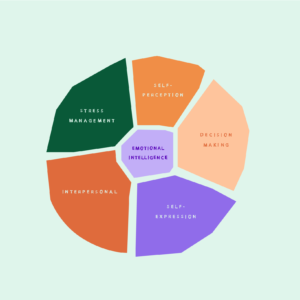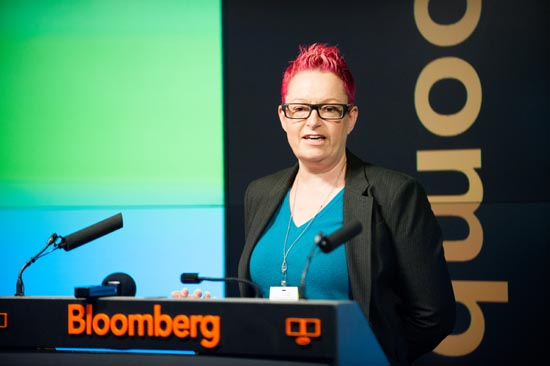5 min. read
How Emotional Intelligence Coaching Can Retain Women In Tech
Anna Gradie on how developing your EQ can accelerate your career growth. Ready to soar?
One of the biggest challenges in the tech industry is retaining women in tech. This is down to a number of factors such as unequal opportunities, gender bias, and plans for parenthood. Low confidence, self-doubt and imposter syndrome can prevent women from thriving in their roles and cause such stress that they change careers.
But there is hope for the industry. In fact, there are some ways that companies can ensure a steady flow of women leaders and innovators in a male-dominated space. We sat down with Anna Gradie, Tech Entrepreneur, Speaker, and Confidence Coach to discuss how Emotional Intelligence Coaching can prevent women from leaving tech and support their career progression.
Anna experienced the reality of the gender gap in tech first-hand. In 2010, she co-founded and scaled an EdTech company into a successful multi-million-dollar business in Canada. Her company developed and sold administrative software to school districts across North America. Despite their goal of employing a diverse and inclusive development team, female developers were still grossly underrepresented. In almost eleven years of rapid revenue growth, only 15% of the total number of software developers hired by her company were women.
Anna’s mission at Anna Gradie Coaching is to help close the gender confidence gap and to accelerate equality in the tech industry by empowering women through professional coahing. She can see a future where men and women are equally represented at tech companies and work together to create incredible, gender-bias-free technological advances for the future generation – where do we sign up?

What is Emotional Intelligence?
Emotional Intelligence (EQ) is the ability to:
1) be aware, understand and express yourself;
2) be aware of, understand, and relate to others,
3) deal with strong emotions and control your impulses
4) adapt to change and solve problems of a personal or social nature

What does your EQ Coaching offer?
“In my coaching practice, I have helped women boost their confidence, leverage their strengths, improve their communication skills, move into leadership roles, set healthy boundaries, and learn to thrive in their tech careers. Coaching empowers you to find your own answers, encouraging and supporting you on your journey to make important life choices.”
EQ coaching creates self-awareness and highlights opportunities for development. It measures fifteen EQ competencies, as shown in the wheel diagram. All competencies can be improved with practice. After you complete the self-assessment, a comprehensive report is generated with actionable strategies to increase your EQ. This report gives crucial insight into your current level of emotional and social functioning.
Anna works with women in tech to explain the results of the EQ report and to formulate an action plan to grow their EQ. She believes that the EQ skills of self-regard, assertiveness and reality-testing are most closely linked to confidence.
Self-Regard
Self-Regard, part of the Self-Perception composite, is an important component of self-confidence.
It involves the ability to accept and respect yourself; knowing your strengths and weaknesses, you essentially like the way you are.
If you score high in self-regard, it is unlikely that you would suffer from imposter syndrome, or be unable to convey your value in career advancement opportunities.
Women typically report lower self-regard in their EQ assessment, compared to their male counterparts, and experience pervasive feelings of self-doubt and not being enough.
How can women improve self-regard?
1. Focus on the Positive
Make a list of your strengths, accomplishments, and achievements. Now visualize your past successes to increase your self-image. Instead of dwelling on your failures, reframe them as opportunities to learn and grow. Our brains are hardwired to focus on the negative for survival reasons. We need to take steps to retrain our brains to concentrate on the positive. Anna probes her clients for their strengths and empowers them to leverage these while also appreciating their weaknesses and areas for growth.
2. Learn a New Skill
Take a course or learn something new. For example, For Anna, after EQ coaching, a software engineer in the US did a “6-week stretch program” in another department of her company, learned new skills and reported increased confidence. When you see yourself trying something new and either failing and learning from it, or repeatedly succeeding in it, this naturally builds your confidence.
What is Assertiveness?
Assertiveness, part of the Self-Expression composite, is:
The ability to express feelings, beliefs and thoughts openly and to stand up for personal rights.
There is a fear that being assertive will be perceived as aggressive. As a result, many women shy away from having difficult conversations at work, contributing to meetings, or asking for raises or promotions.
Developing EQ requires striking a balance between the different EQ skills closely connected to each other. For example, assertiveness must be balanced with empathy for effective communication. A high score in assertiveness can be a blind spot indicating low empathy. Having the ability to communicate assertively, while still being empathetic to the audience, greatly improves communication. Better communication skills increase self-confidence.
The more you see yourself succeeding in assertive conversations, the more confidence you will gain. For example, while working with Anna, a female senior software developer in the US reported being able to “set hard lines” at work more by taking paid time off for banked overtime hours and requesting a company phone for being on-call or running security checks when writing code.

How can you develop assertiveness?
1. Overcome Fear
Identify the last three times you didn’t contribute to a meeting, or ask for a raise or promotion. Then, brainstorm all the possible positive and negative results that could have occurred had you been more assertive. Fear mostly comes from an exaggeration of bad consequences. Think of situations where the good consequences outweighed the bad. Identify when similar situations will be occurring in the future to give yourself opportunities to practice being more assertive. The more we practice being assertive, the easier it gets.
2. Have a Goal in Mind
Set a small goal before you go into an assertive conversation. It is easier to assert yourself when you have a clear goal upfront. Tie this smaller goal to a larger performance objective, so you know something bigger is at stake.
What is Reality-Testing?
Reality Testing, part of the Decision-Making composite, is about:
Seeing things objectively, rather than the way we wish or fear them to be; tuning in to the immediate situation with an unbiased view.
A high score in reality testing means that you don’t let your inner critic color your perceptions of conversations or events. Many of us suffer from a negative internal dialogue that erodes our confidence and prevents us from thriving at work. When we see things how they really are, you have the power to make better decisions in your lives.
Anna recommends these strategies to improve reality-testing:
1. Break it Down
Breaking a problem or decision down into small, practical steps helps you stay focused on the reality of the situation and not what you wish or fear would happen. Practical actions include specific steps, resources, or buy-in required to make a decision. Listing practical actions will help you stay grounded under pressure by keeping your focus on specific tasks required to reach an unbiased decision.
2. Reduce Negative Self-Talk
Limit your negative self-talk by noticing it when it arises and retraining your brain to focus on the positive. Anna runs Six-Week Mental Fitness Bootcamps with her clients who report great outcomes. For example, within the first few weeks of the program, an Advanced Data Analyst reported a significant mental shift where she was able to take greater control of her self-sabotaging thoughts and use her internal wisdom to turn setbacks into gifts or opportunities. Through weekly videos, short mental fitness exercises on a science-based app and accountability pods, women in tech can learn to tame the inner critic and to live more confident lives.

How can women take action from this interview?
“To boost your confidence to thrive in your tech career, I strongly encourage you to:
1.Book a free Confidence Booster Session with Anna
2.Complete the EQ self-assessment to gain crucial self-awareness;
3.Formulate an action plan to grow EQ; and
How can companies support women to improve retention?
Why not offer Emotional Intelligence or confidence coaching as a perk for your employees and retain your team in the long run? If you’d like to learn more about retaining women in tech, check out our guide with Sheree Atcheson here.





